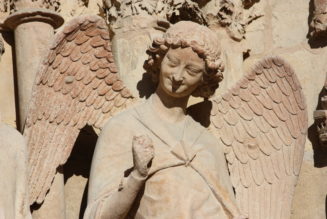, October 8, 2020

This Sunday, the 28th Sunday of Ordinary Time, Year A, the Gospel and readings describe how great the Christian life is, now and in heaven, and how unsuited for it many of us are — literally unsuited, in the Gospel.
We are unsuited for heaven, first of all, because we can’t be bothered to change our course now in order to go there.
Jesus tells the Parable of the Wedding Feast, in which a King “dispatched his servants to summon the invited guests to the feast.” Guests were already invited — so this is a final summons, the “All is ready. Come!”
The guests can’t be bothered to come, but rather than write them off, the King woos them. He sends his servants to make the offer more enticing, describing the food and expense he has gone to.
They still stay home. “Some ignored the invitation and went away, one to his farm, another to his business.” Others kill the prophets, sparking his great wrath.
Allegorically, these servants are the prophets reaching out to the Chosen People of Israel. For us, they are the efforts of the Church to woo us. St. Jerome says the regal foods at the banquet are “the greatness of the doctrines, and the manifold teaching of God in his law.” The Jewish people ignored or destroyed the prophets; we ignore or destroy the teachings of the Church.
Why? We are betting that the fulfillment we get from a career and comforts will be greater than the fulfillment of the Christian life. We don’t think of the faith as a magnificent banquet of delights. We think of it a tedious bore. We check e-mail and social media rather than pray our morning meditation. We spend our best time seeking entertainment and working for a paycheck rather than seeking God and serving his image and likeness in our family and neighbors.
The fact that the banquet also represents heaven doesn’t help us. Many (most?) of us think heaven will be boring.
Pope Benedict XVI says that a lack of a desire for heaven keeps many people away.
“Many people reject the faith today simply because they do not find the prospect of eternal life attractive,” he writes in his 2007 encyclical Spe Salvi (Saved in Hope). “What they desire is not eternal life at all, but this present life, for which faith in eternal life seems something of an impediment. To continue living for ever — endlessly — appears more like a curse than a gift. Death, admittedly, one would wish to postpone for as long as possible. But to live always, without end — this, all things considered, can only be monotonous and ultimately unbearable.”
We would rather max out our spending power on earth than store up treasures in heaven, so we say “No thank you,” to the king’s invitation.
The Church uses Sunday’s readings to do for us what the messengers do for the guests: Make the offer more enticing.
The readings describe how great the Christian life is, starting now. It is a life of celebration, not drudgery.
St. Paul’s words in the Second Reading have become a favorite Christian inspirational quote: “I can do all things in him who strengthens me.”
Paul explains how friendship with Jesus gives him fulfillment, “In every circumstance and in all things.” If you abandon yourself to him, “God will fully supply whatever you need, in accord with his glorious riches in Christ Jesus.” He will do this both “in humble circumstances” and “with abundance.”
In other words, the Christian life offers the detachment of a Stoic or a Buddhist, then adds untold spiritual riches. Jesus changes everything. In Christ, your suffering becomes your participation in the royal way of the cross and your prayers and acts of service take on cosmic significance. He carries you through good times and bad. He redefines you from wage-earner and pleasure-seeker to the brother or sister of the King of the Universe.
The readings also tell us that heaven won’t be a life of tedium, but a life of perpetual refreshment.
We fear that heaven will be an exile to a strange place — but the Church tells us that the opposite is true. We are in exile now, and heaven will a homecoming, because “the Father’s house is our homeland,” says the Catechism.
Heaven will be utterly suited to us. According to today’s first Psalm it will be like a spring picnic in a meadow by a brook: “In verdant pastures he gives me repose; beside restful waters he leads me.” There, he will “spread the table before” us with what Isaiah says is “a feast of rich food and choice wines; juicy, rich food and pure, choice wines.”
Pope Benedict describes these joys not as earthly pleasures, but as spiritual fulfillment.
Eternity is “not an unending succession of days in the calendar, but something more like the supreme moment of satisfaction … like plunging into the ocean of infinite love, a moment in which time — the before and after — no longer exists … a plunging ever anew into the vastness of being, in which we are simply overwhelmed with joy.”
It’s not an individualistic joy, either. As Isaiah puts it: “He will destroy the veil that veils all peoples, the web that is woven over all nations.”
Peace, harmony, joy, and communion … it actually sounds a lot like a wedding banquet.
At wedding banquets we plunge into the present moment and allow ourselves to believe that a “happily ever after” has begun. The Christian life truly is a happily ever after that began when we received our baptismal garment.
But there’s the catch: Heaven is suited to us, but we can become unsuited to heaven. Jesus adds a key detail. The king comes to meet the guests and “he saw a man there not dressed in a wedding garment.” The guest has nothing to say for himself, so the king orders: “Bind his hands and feet, and cast him into the darkness outside, where there will be wailing and grinding of teeth.’ Many are invited, but few are chosen.”
Our baptismal garment, as clean and renewed as it was when we received it, is required attire in heaven. This guest strayed from God and didn’t come clean in confession, choosing a life of sin over a life of grace.
St. Gregory says something chilling about the place where he receives punishment: “There shall gnash those teeth which here delighted in gluttony; there shall weep those eyes which here roamed in illicit desire; every member shall there have its peculiar punishment, which here was a slave to its peculiar vice.”
It’s a stark choice: A life of celebration in Christ followed by an eternity of rest with God — or a life of slavery to sin followed by an eternity with our chosen master.
It’s a choice we are meant to offer to others. As Jesus says, “Go out, therefore, into the main roads and invite to the feast whomever you find.”
Tags: 28th Sunday in Ordinary Time (Year A), prayer, Sunday Gospel, Sunday Readings
Never miss a post! Subscribe below to our weekly newsletter.









